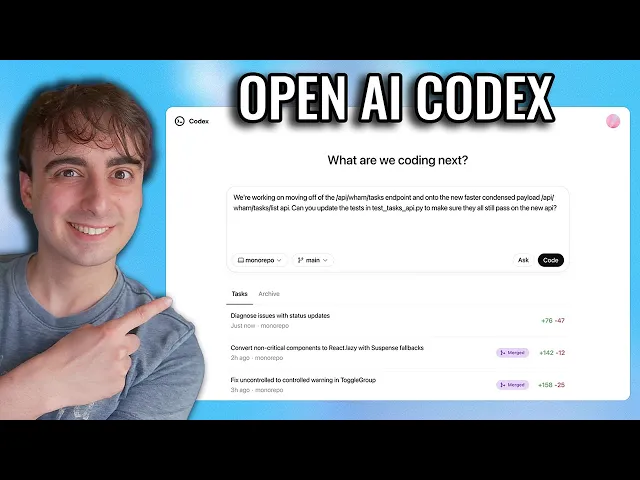Open AI Unleashes Codex AI; Powerful New Vibe Coding Agent

OpenAI's Codex might revolutionize coding forever
OpenAI has quietly unveiled Codex, a powerful AI coding assistant that represents a significant leap forward in programming technology. While it hasn't garnered the same mainstream attention as ChatGPT, this specialized AI model could fundamentally transform how developers work by generating, explaining, and refining code across multiple programming languages with remarkable contextual understanding.
Key Points
-
Codex functions as an AI pair programmer that can interpret natural language commands and convert them into functional code, dramatically reducing development time for both simple and complex tasks.
-
Unlike previous code-generation tools, Codex maintains contextual awareness throughout a programming session, enabling it to build upon previous commands and incorporate existing code structure when generating new solutions.
-
OpenAI has designed Codex with impressive versatility across programming languages (Python, JavaScript, etc.) and the ability to handle diverse tasks from web development to algorithmic problem-solving.
-
The system includes built-in code explanation capabilities, enabling it to break down complex functions for better understanding and teaching opportunities.
-
While powerful, Codex still requires developer oversight to verify accuracy, security, and efficiency of generated code – it enhances human programmers rather than replacing them.
The Transformative Impact on Programming Workflows
The most profound insight from OpenAI's Codex is how it reimagines the relationship between developers and their tools. Traditional programming involves tedious syntax memorization and repetitive implementation patterns. Codex shifts this paradigm by allowing developers to focus on problem-solving at a conceptual level while the AI handles translation into executable code.
This matters tremendously because it addresses the growing complexity crisis in software development. As systems become increasingly sophisticated and interconnected, the cognitive load on developers has skyrocketed. By abstracting away implementation details, Codex creates space for engineers to think about architecture and user experience instead of wrestling with syntax or documentation. This could accelerate innovation cycles across the industry while making programming more accessible to newcomers.
Beyond the Demo: Real-World Applications and Limitations
What the video doesn't fully explore is how Codex is already transforming commercial software development workflows. Companies like GitHub (with Copilot) have implemented Codex-powered tools that are showing impressive results. Early adopters report productivity increases of 30-50
Recent Videos
How To Earn MONEY With Images (No Bullsh*t)
Smart earnings from your image collection In today's digital economy, passive income streams have become increasingly accessible to creators with various skill sets. A recent YouTube video cuts through the hype to explore legitimate ways photographers, designers, and even casual smartphone users can monetize their image collections. The strategies outlined don't rely on unrealistic promises or complicated schemes—instead, they focus on established marketplaces with proven revenue potential for image creators. Key Points Stock photography platforms like Shutterstock, Adobe Stock, and Getty Images remain viable income sources when you understand their specific requirements and optimize your submissions accordingly. Specialized marketplaces focusing...
Oct 3, 2025New SHAPE SHIFTING AI Robot Is Freaking People Out
Liquid robots will change everything In the quiet labs of Carnegie Mellon University, scientists have created something that feels plucked from science fiction—a magnetic slime robot that can transform between liquid and solid states, slipping through tight spaces before reassembling on the other side. This technology, showcased in a recent YouTube video, represents a significant leap beyond traditional robotics into a realm where machines mimic not just animal movements, but their fundamental physical properties. While the internet might be buzzing with dystopian concerns about "shape-shifting terminators," the reality offers far more promising applications that could revolutionize medicine, rescue operations, and...
Oct 3, 2025How To Do Homeless AI Tiktok Trend (Tiktok Homeless AI Tutorial)
AI homeless trend raises ethical concerns In an era where social media trends evolve faster than we can comprehend them, TikTok's "homeless AI" trend has sparked both creative engagement and serious ethical questions. The trend, which involves using AI to transform ordinary photos into images depicting homelessness, has rapidly gained traction across the platform, with creators eagerly jumping on board to showcase their digital transformations. While the technical process is relatively straightforward, the implications of digitally "becoming homeless" for entertainment deserve careful consideration. The video tutorial provides a step-by-step guide on creating these AI-generated images, explaining how users can transform...
